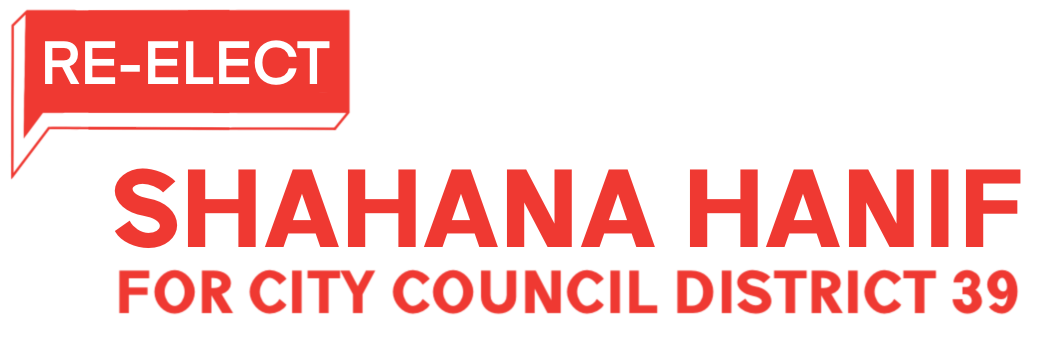COMMUNITY HEALTH PLAN
An underfunded healthcare system is life or death. Healthcare is a human right, and we must organize for universal healthcare, and pass the NY Health Act and Medicare for All. However, until our state and federal government meet this overwhelming demand, New York City Council must do everything in its power, especially during a global pandemic, to expand health coverage for all New Yorkers. Citywide programs remain inaccessible because of medical bias, language inaccessibility, cultural stigma, and ineffective and incomprehensive outreach that fails to reach the most immigrant, undocumented, and underinsured New Yorkers. These disparities were only exacerbated by the COVID-19 pandemic, particularly as working-class neighborhoods of color became the epicenter of the pandemic.
As a Lupus survivor who had to navigate through a nebulous and costly healthcare system at 17, Shahana knows the importance of expanding healthcare and disability accessibility to all New Yorkers. No New Yorker should be denied or forgo healthcare because of lack of insurance, immigrant status, or fear of bias.
As Councilmember, Shahana will:
+ Expand health services to all New Yorkers
- Nourish a more diverse community and public health workforce that can provide culturally responsive primary care in immigrant communities.
- Provide greater funding to educational pipelines and professional development for new Americans.
- Advocating for greater funding and loan forgiveness to public colleges with public health training.
- Expand the scope of NYC Care to include community-based health providers outside of Health + Hospitals existing network.
- Create a Citywide Interpretation Fund to train and retain confidential, anonymous, high-quality interpreters and translators in mental health fields, particularly in outpatient primary care and mental health services.
- Host workshops with interpreters, medical students and social workers, and community health providers about best practices when working with medical interpreters.
- Throughout COVID-19 and in case of large disease outbreak, restore funding to programs that help community centers and houses of worship host vaccination sites.
- Partner with places of worship, immigrant-owned businesses, and CUNY Citizenship Now! to host immigration legal services, workshops around healthcare rights, and IDNYC.
- Address food insecurity through advocating the State and Federal government for expanding Supplemental Nutrition Assistance Program (SNAP) eligibility, and increasing City funding to programs like the Healthy Bodegas Initiative, Health Bucks, GrowNYC, and CUNY’s Food Insecurity Program.
- Advocate for expanding sites that will accept SNAP, including farmers markets and online food delivery sites, while exploring new programs that would allow SNAP recipients to receive discounts at cultural institutions and businesses.
- Push for expanding community gardens in public parks and on our city’s 40,000 acres of rooftop space, and increase summer youth employment (SYEP) opportunities in community gardens and farms.
- Expand funding to overdose prevention centers and harm reduction sites, like VOCAL-NY, who host needle exchanges and narcan training.
+ Support elders and caretakers in our city
- Funding community-based organizations that service elders such as the Met Council and the Chinese American Planning Council.
- Support for caretakers by:
- Expanding accessibility for elders and their families to get caretaker support so elders can age in place
- Partnering with the Health and Hospitals Corporation, the Department of Health and Mental Hygiene, and the Department of Aging on workshops directed for family members who serve as caretakers of elderly relatives (ex. Workshops on medical care, legal rights for elders, applying for Medicare.)
- Fully funding EISEP (Expanded In Home Services for the Elderly) to ensure that the Department of Aging is able to provide at-home care to elders and limit the wait list.
- Helping caretakers apply for the NY State Medicaid CDPAP program that pays caretakers for taking care of their elderly relatives.
- Partner with public libraries, houses of worship, and other community based senior centers to host technology workshops and provide drop-in tech support to help increase tech accessibility for seniors which can include helping seniors apply for benefits online or accessing care through telehealth.
- Expand access for mental health services for elders:
- Partner with community based organizations to host workshops that help deconstruct stigmas with mental health care.
- Host public programming for elders in the district at open spaces like Avenue C Plaza and Prospect Park to address loneliness and social isolation.
- Connect elders with community partners, instead of the police, to help escort elders home or to help with any other safety concerns.
- Require nursing homes in New York City to report on their quality of care.
+ Destigmatize mental health
- Expand and invest in pipeline programs like the Mental Health Service Corps to train the next generation of the city’s mental health professionals and provide free behavioral health services to New Yorkers.
- Partner with organizations working with immigrant communities and communities of color to recruit a more diverse pool of mental health counselors for the Mental Health Service Corps
- Place Corps members in trusted community-run organizations, in addition to serving in the city’s public hospitals, and run outreach campaigns that destigmatize accessing mental health care
- Commission public art and multilingual messaging campaigns in public transportation, ethnic media, and open spaces about how to access mental and physical care.
- Ensure the City’s free mental health first aid training program is facilitated in more languages than its current offerings of English and Spanish.
- Increase City’s funding of community organizations, like Sakhi NYC, that provide mental health services and support in Black, brown, and immigrant communities
- Strengthen mental health services in the NYC DOE schools, focusing on students of color, students speaking languages other than English, and LGBTQ students. This can be funded through diverting funding from NYPD school officers towards hiring school-based counselors and therapists.
- Increase the City’s investment in mental health services on CUNY campuses, and recruit mental health counselors of color, with disabilities, and from immigrant communities.
